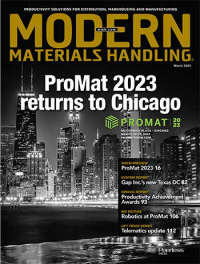Who wants to pay for a palletizer upfront?
The alternative is a robots-as-a-service system that replaces capex with a lease and guaranteed performance levels. Might be worth reading on.
We’ve all heard plenty of talk about the possibility of a recession coming our way soon. As a result, we’ve also heard about companies from a range of industries slamming the brakes on capital expenditures. So much for the recent upward trajectory of materials handling automation installs.
Well, maybe not. Just ask Bernard Casse, CEO and founder of RIOS Intelligent Machines. A favorite topic of his is robots-as-a-service (RaaS). Instead of purchasing a robotic palletizer outright and upfront, Casse says, users have the option to pay a monthly fee for a set of services including designated throughput levels.
“The idea is to de-risk the customer’s investment in automation. Operations are monitored remotely while uptime and performance are guaranteed. If a palletizer is down for 60 minutes, for instance, RIOS pays the end user for the loss of palletizing services,” Casse says. That should get your attention.
RaaS is a highly customized approach to palletizing for companies of all sizes. Talk a little more with Casse, and he describes how much more customized the company’s Vulcan end-of-line palletizing solution can be.
It quickly becomes apparent that Casse is talking about a modular system with a high degree of reconfigurability and intelligence tailored to the specific application. He says the core is a Fanuc high-speed robot fully integrated with RIOS software, which can allow for throughput of 40 to 60 items a minute.
The rest of the palletizing system is built to meet the needs of the end user. That includes box sizes and mix, pallet size and units per hour—not to mention the look of the finished pallet. There’s also the matter of the palletizer’s general layout and its integration with other end-of-line shipping department operations. What’s not to like about that?
Casse explains how each robotic system is integrated into a workcell. “Each robot is retrofitted with a particular end-effector tailored to handle a broad class of items with human-level dexterity,” adds Casse. “Our advanced artificial intelligence helps the robot not only to recognize different objects, but also to understand the items’ pose [orientation in space] and to compute their grasp points. Importantly, the decision-making AI algorithms are designed to enable the robot to learn to adapt to edge cases. Over time, these algorithms enable the robots to handle a broad range of corner cases autonomously.”
Consumer packaged goods are the sweet spot for these systems, adds Casse. RIOS has built a lot of software-defined infrastructure for sorting, precision handling, quality checking and packaging of items. Furthermore, RIOS, not the end user, covers the risk to keep the system operating as needed, even 24/7.
“This is revolutionary,” says Casse. “This approach to robotic palletizing is a real inflection point for packaging automation going forward.”
Only time will tell, but there do appear to be several new angles on the established capex model that make this worth considering.

Article Topics
RIOS Intelligent Machines News & Resources
RIOS Intelligent Machines completes $13 million Series B funding round Who wants to pay for a palletizer upfront? Robotics solution provider RIOS lands $28 million in new fundingLatest in Materials Handling
Beckhoff USA opens new office in Austin, Texas Manhattan Associates selects TeamViewer as partner for warehouse vision picking ASME Foundation wins grant for technical workforce development The (Not So) Secret Weapons: How Key Cabinets and Asset Management Lockers Are Changing Supply Chain Operations MODEX C-Suite Interview with Harold Vanasse: The perfect blend of automation and sustainability Consultant and industry leader John M. Hill passes on at age 86 Registration open for Pack Expo International 2024 More Materials HandlingAbout the Author
Subscribe to Materials Handling Magazine

Find out what the world's most innovative companies are doing to improve productivity in their plants and distribution centers.
Start your FREE subscription today.
April 2024 Modern Materials Handling

Latest Resources












